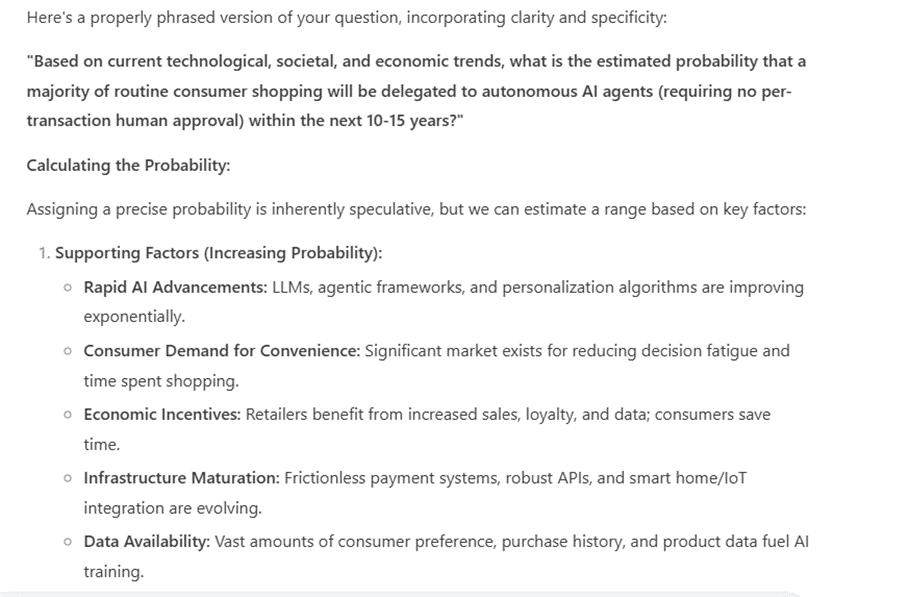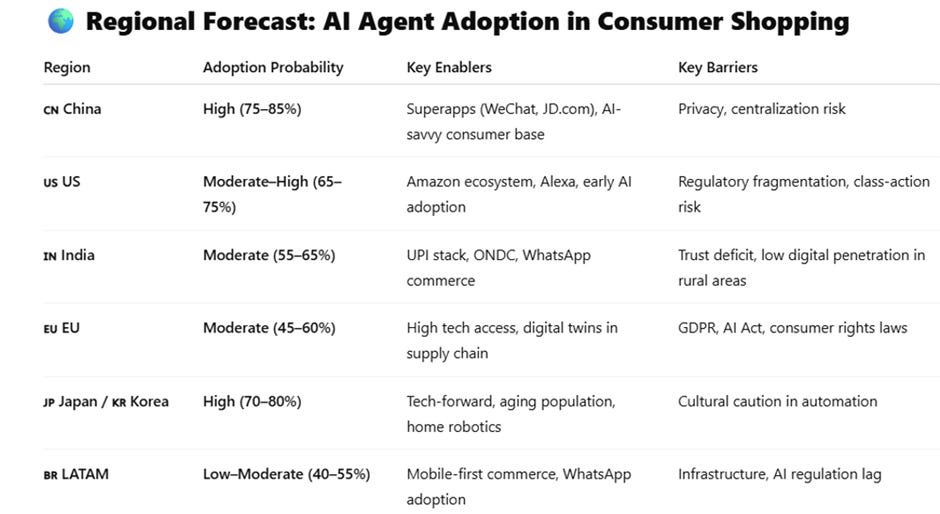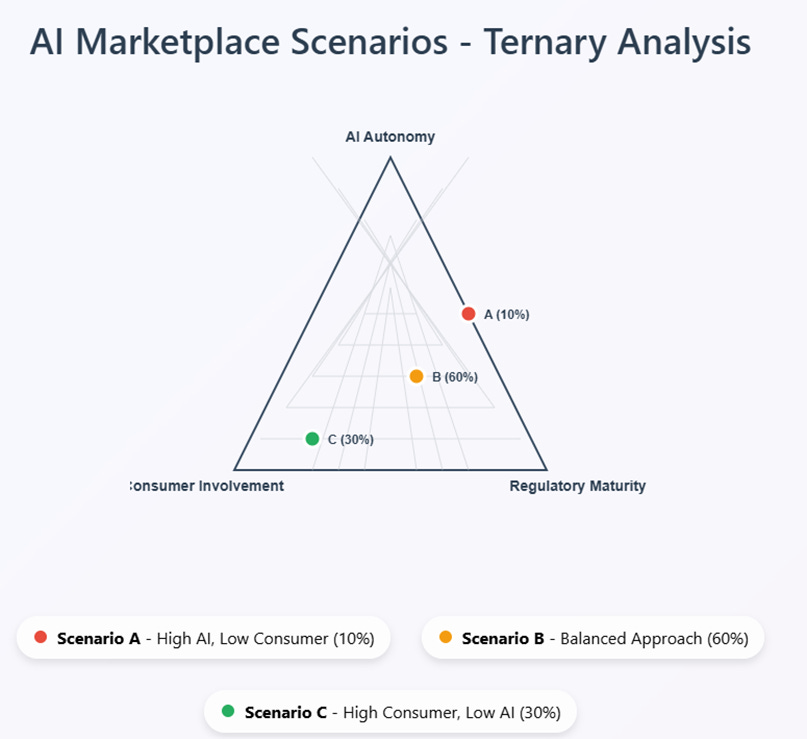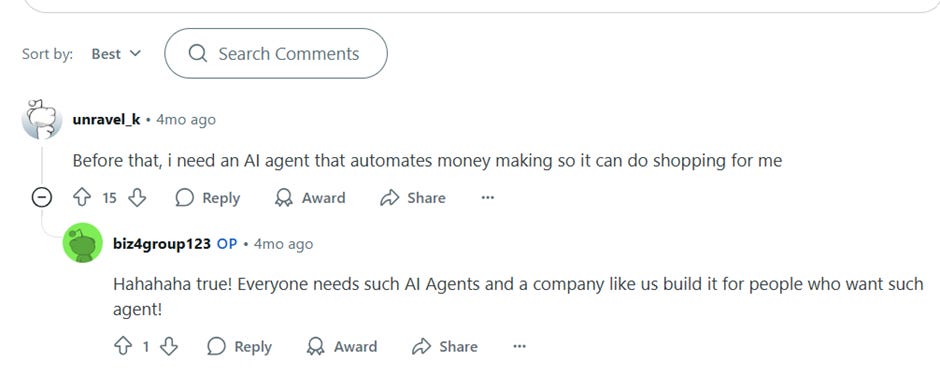AI Series Part 1 – Marketplace, e-commerce and digital-native companies 3.0 :A Primer on AI-Powered commerce
What is the future of commerce in an agentic-AI driven world. #AI #agentic-AI #ikea #Walmart #airbnb #meesho #ecommerce #
Hello Hello,
The readers of thinking category newsletter 🤩
There are moments in history when the operating model of businesses at large changes.
In the 1980s, Internet made it possible for people to go online, access information and communicate through Transfer Control Protocol/Internetwork Protocol (TCP/IP). It laid the groundwork for how businesses would operate in the years to come. A stack of papers on the office desk was replaced by a square-looking, mainly, white computers and the primary mode of communication to bosses became emails even when your boss sitting just a cabin away.
In the 2020s, another world event – global pandemic pushed even small merchants in India to move their businesses online since offline operation was no longer a possibility. Start-ups were awarded handsomely- those that were able to align themselves with customer needs, adapt to market shifts, and respond with agility.
Another such world event is currently unfolding in the form of Generative AI.
One thing is very clear: from the historical shifts and learnings. We must be ready for a human-AI collaborative future. Because the genie is out of the bottle.
My journey of learning AI and its tools started when ChatGPT appeared few years back like an omniscient GOD who is like that friend of yours who knows-it-all but somehow never manages to irk you. (The version of Sheldon Cooper that his friends would like) and in the near future, can do it all.
In the last few months, I have spoken with dozens of business, tech leaders and on-ground operators who are figuring out how AI will impact their business, how they can leverage AI to drive revenue and bring out operational efficiency by deploying across workflows and use-cases (specifically in the context of my work, role and Industry).
In this 4-part AI special series, I’m going to decode the conversation and distill my learnings.
Part 1: I will construct scenarios and examine the likelihood of fully-autonomous agentic-AI taking over how we shop.
Part 2: I will deep-dive into real-world case studies (mainly in ecommerce, marketplace, and digital –native companies) about where and how AI is getting is deployed across workflows.
Part 3: I will lay out the AI safety framework and non-negotiable guardrails that e-commerce and marketplace companies must establish to build responsibly.
Part 4: I’ll explore how AI can power sustainability across the e-commerce value chain and the paradoxical relationship of AI with sustainability.
On to the task at hand:
For all the history buff there - let’s trace how the marketplaces have evolved through the ages. And, then let’s draw a line to the future. ⌛
Marketplaces have evolved/are evolving through 3 distinct phases - each driven by a major technological shift.
Marketplace 1.0: The earliest form of marketplaces was physical. Imagine the vibrancy and hustle-bustle of Indian Haat Bazaars or ancient Greek Agoras or Trajan's Market or Markets of Mesopotamia. Whichever market you imagine, you know that it is all about humans interacting with other humans. Haggling over whatever it was they haggled over. They were the commercial heart of the early civilization. As centuries passed, it evolved into fancy malls, shopping centres, and mom and pop stores.
Then came the mail-order catalogues. Telephone-based shopping. But the operating model was same: human interacting with other human beings. The promise-land of full-on digital was still few years away.
Marketplace 2.0: In the year 1995, the launch of eBay marked the beginning of a new digital world where people started buying online. Amazon sold books online. Later, niche vertical marketplaces started cropping up. Now we are living in a time when there is a marketplace for everything. Uber, Rapido for drivers. Airbnb, MMT for hotels and accommodation and so on and so forth.
The phase can be broadly defined into 2 phases:
1. Listing-based platforms like Craigslist, where users could post products or services; and
2. Transaction-enabled platforms, powered by tools like PayPal that simplified digital payments.
These platforms evolved into sophisticated, multi-sided ecosystems, leveraging behavioural data, API integrations, and real-time feedback loops to seamlessly serve buyers, sellers, and service providers at scale.
All in all, this new era of marketplaces was made possible because of the invention of Web 2.0 and thrived because of platformization.
Marketplace 3.0:
Every retailer must become an AI retailer." - Marc Benioff (CEO, Salesforce)
During the discussion with the founder of a new marketplace I advise, the founder raised an intriguing question: “What will the marketplace look like in the near and long-term future?"
Right now, you look for an information on the internet, it follows a predictable set of steps: You open a browser, type the query and keywords into the search bar, and then scroll the results. While you do that, you also hope that you don’t fall into the rabbit hole of endless tabs.
But now, I am sure that you are acquainted with the Generative AI models/interface available - ChatGPT, Perplexity, Claude, or another LLM-powered assistant. These models synthesize and deliver curated content with contextual answers in natural language. It saves you the joy — or agony, whichever it is for you — of scuttling through webpages. Apart from occasional cases of hallucinations, bias, inaccuracy, or patronizing you by responding – “Great question!” it just works.
The ChatGPT of shopping : The future
For long, amazon has taken pride in offering the world’s largest selections to its customers. The flywheel of amazon counts on it, moves because of it.
Does it overwhelm, confuse, or slow down decision-making for the customers? We might need contrarian thinking there.
So now imagine a sleek, intuitive interface – much like these model – where you don’t scroll through the digital equivalent of endless aisles, put one filter after another, and glance view hundreds of irrelevant products.
You just type - “I need a branded blue colour formal shirt under 2000 Rs.”
The platform understands your preferences, context, and intent. Multiple agents working in the background on your behalf. They know your size, style or colour choices.
This is Agentic-AI in action: Orchestrating the entire customer journey from discovery to checkout. Even completing transaction process. It has one objective: Get the shopping done. You don’t need to be rich after all to get your own butler.
In this future, AI will be the primary interface between buyers, sellers, and commerce infrastructure. A complete tech-stack overhaul to fully leverage agentic-AI might not be required. Companies will implement AI as flexible, and parallel layers that augment their existing tech-stack. Tech-stack required to enable the marketplace 3.0 would change from traditional e-commerce infrastructure to AI-native architectures:
Legacy rule-based workflows → Self-learning, dynamic decision engines
Manual merchandising → Autonomous selection and bundling
Static UX flows → Conversational and multimodal interfaces
Fragmented data systems → Unified real-time customer intent modelsMarketplace 3.0 is about reimagining everything from catalogue operation to transaction. We will discuss this in the Part 2.
Let’s have a poll. I am curious to know what you guys think:
To paraphrase James Thurber, “One poll is all right. Two are too many, and three are not enough.”
Till the time I get sufficient datapoints to draw a conclusion : To test my hypothesis, I asked this question to LLM models - ChatGPT, Claude and Deepseek.
“Based on the current technological, societal, and economic trends, what is the estimated probability that a majority of routine consumer shopping will be delegated to autonomous AI agents (requiring no per-transaction human approval) within the next 10-15 years?"
Response from ChatGPT:
It estimated 65% probability that the future of shopping will be autonomous agents. It is based on -
1. Technologic trends, Infrastructure and rapid AI advancement
Advanced AI models - High maturity of large language models (LLMs), coupled with the emergence of autonomous agent frameworks (like AutoGPT, Devin, and OpenAgents)
Advancement in recommender system
Wallet integration
Decreasing AI cost
2. Consumer needs to reduce decision fatigue and time spent shopping
It also stated that this will be at the very least possible for the routine/grocery/household product that consumer buy frequently.
Response from Deepseek:
While ChatGPT and Deepseek were more optimistic about this form of shopping, Claude, not so much.
Response from Claude:
Reasoning: Privacy concerns. “Nearly 82 percent of consumers say they are somewhat or very concerned about how the use of AI for marketing, customer service, and technical support could potentially compromise their online privacy.”
ChatGPT not only provided estimation at the macro-level, it drilled it down further by region and country-level probability:
Let’s do another exercise – Scenario Building. We will map out different scenarios -Unlikely, Realistic, and Optimistic futures of agentic commerce—based on technological, regulatory, and behavioural factors.
These scenarios are based on 3 components:
AI Agent Autonomy (how independently the agent operates)
Consumer Involvement (how much input the user gives)
Regulatory Maturity (how evolved and enabling the regulation is)
Scenario Building is about trends spotting. In the below section, you will find some trends emerging from the conversation.
From Trends to Tomorrow: What Industry Leaders Are Saying
The Wall Street Journal (WSJ) reported on Walmart- The retail giant is exploring how to make its products not only attractive to human buyers but also to autonomous AI agents that may soon handle shopping tasks on behalf of consumers. By Jerry Sheldon, retail analyst at IHL -
“Walmart’s announcement is a strong signal that they see AI shopping agents as an inevitable and imminent part of the retail landscape. This move validates the momentum behind agent-based commerce and sets expectations for the broader industry.”
Andy Jassy of Amazon CEO emphasized shopping as a key area for AI disruption- Increasingly, you'll see AI change the norms in coding, search, shopping, personal assistants, and a lot of other customer experiences.
Airbnb CEO Brian Chesky on how Artificial Intelligence can be used to personalize experience for the customers. He said in one of the podcasts :
Number one, I think Airbnb will in and of itself be an AI application.
The second idea was Airbnb, to the point of AI, was going to become an agentic app. It was going to become the ultimate concierge for traveling and living, and we’d become the ultimate agent. By the way, if you think the future of AI is agents, what are the most common agents in the world? Travel agents, customer service agents.
Garima Singh - Chief Architect of the Ingka Group explained how Ikea is leveraging AI as a co-pilot to improve CX -
You can sit on your sofa and take a picture of the space that you want to renovate or design, then you can completely erase the room and redesign it with the help of our AI-powered digital assistant. Or you can select one of the sofas or chairs from our catalogue and place it where it suits you best. Then would you like to combine it with this carpet or that painting? This particular feature has helped our customers to design a space virtually without visiting the store, and that really enhances their creativity, rather than replaces it.
This is all for the day. As I write this, I hear news of AI refusing to shut down. So I just hope that whatever the future of shopping is, we live to see it 🙂
In the next post, I plan to discuss business use-case specific to ecommerce, or digital-native companies and how AI is going to redefine consumer experience (CX). But, more on that later. If you’d like to receive the part-2 of this series as soon as it is published, make sure to subscribe to the newsletter.
Until then, see ya! And, I'd love to connect, exchange ideas, and learn more if you're building or working on something exciting in the Agentic AI + commerce space. DM me at LinkedIn.
As an ending note, some fun reddit comments for your lazy weekend afternoon:
Have a great weekend🎉
Thanks,
Neetu
© 2025 [Neetu Barmecha]. All rights reserved.
This content is the intellectual property of the author. Do not reproduce without permission.











